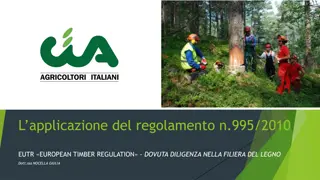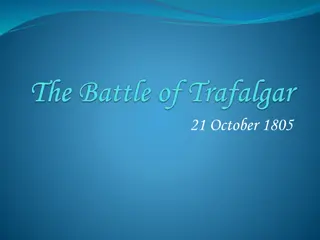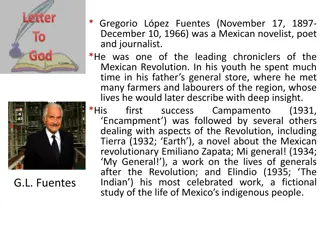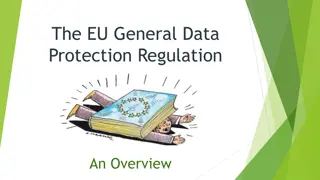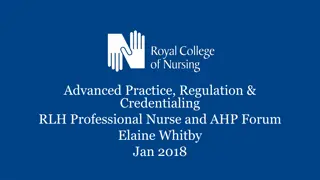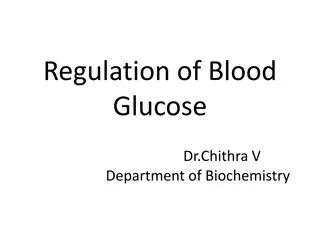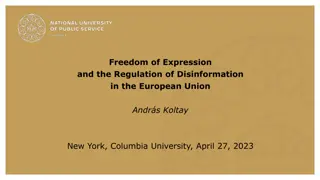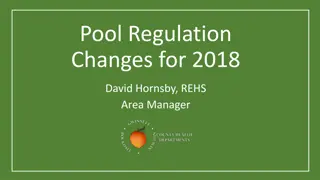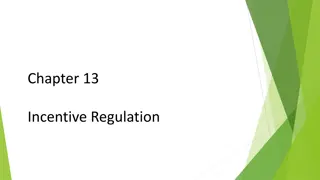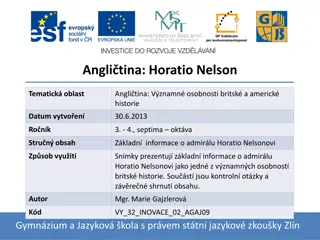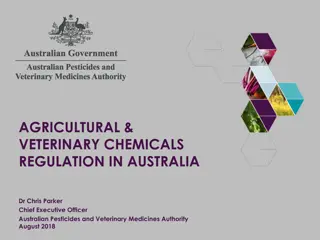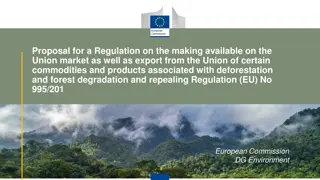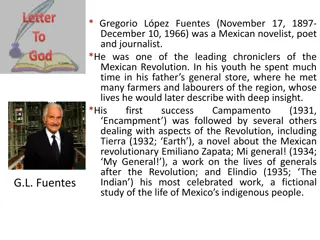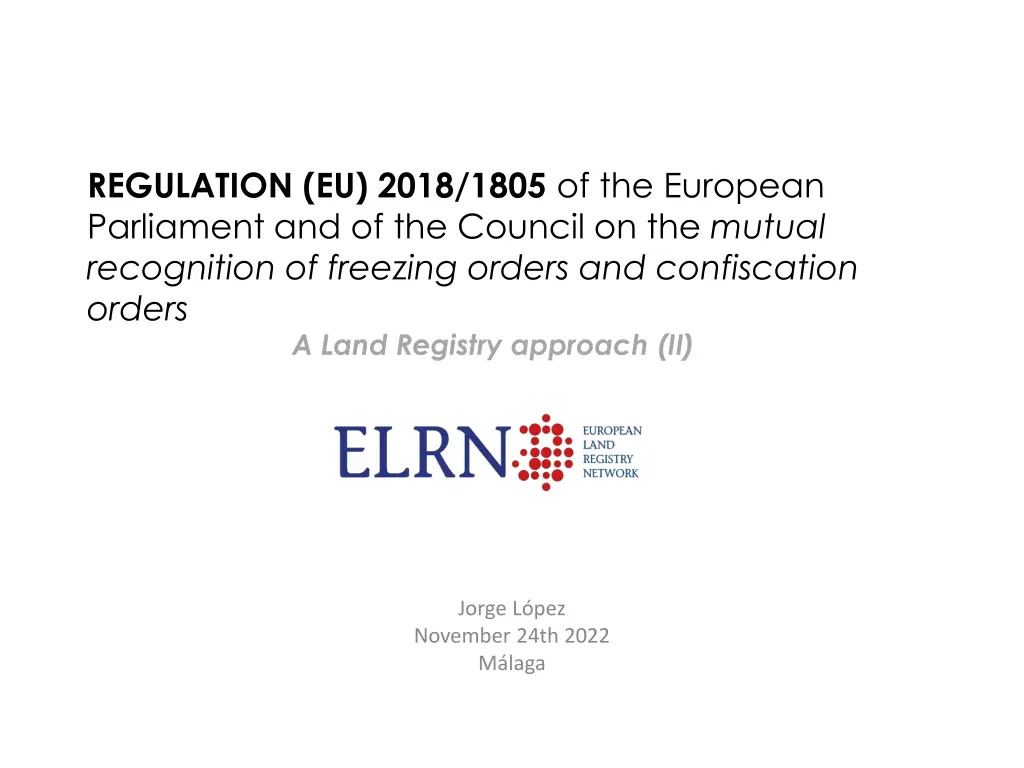
European Regulation 2018/1805: Mutual Recognition of Freezing and Confiscation Orders
Learn about the European Regulation 2018/1805 focusing on the mutual recognition of freezing and confiscation orders within the European Union Member States. Explore the framework, list of criminal offenses, and land registration aspects related to these orders, as well as the impact on land registration and restitution processes.
Download Presentation

Please find below an Image/Link to download the presentation.
The content on the website is provided AS IS for your information and personal use only. It may not be sold, licensed, or shared on other websites without obtaining consent from the author. If you encounter any issues during the download, it is possible that the publisher has removed the file from their server.
You are allowed to download the files provided on this website for personal or commercial use, subject to the condition that they are used lawfully. All files are the property of their respective owners.
The content on the website is provided AS IS for your information and personal use only. It may not be sold, licensed, or shared on other websites without obtaining consent from the author.
E N D
Presentation Transcript
REGULATION (EU) 2018/1805 of the European Parliament and of the Council on the mutual recognition of freezing orders and confiscation orders A Land Registry approach (II) Jorge L pez November 24th 2022 M laga
Overview (1). Mutual cooperation Framework: the mutual cooperation in criminal matters of the UE Member States: Tampere European Council (1999) and Stockholm Program (2009) Framework Decisions (Council) 2003/577/JHA and 2006/783/JHA: the mutual recognition of freezing orders and confiscation orders Directive 2014/42/EU establishing minimum rules on the freezing and the confiscation of property Regulation(EU) 2018/1805 of the European Parliament and the Council of 14 November 2018: Act of the Union legally binding and directly applicable in the MSs Entry into force: December 19 2020 (Article 41)
Overview (2) Regulation 2018/1805 Mutual recognition of Freezing orders (Article 2.1) and Confiscation orders (Article 2.2) and execution in the same way as for a domestic order (Art. 7) A list of criminal offences (Article 3) Inside the list: application without verification of double criminality [e.g. AML Art.3.1) 8 and 9] Outside: application subject to condition of constituting a criminal offence according to the law of the executing State Procedure based on: The relationship between Issuing Authority /Executing Authority A standard certificate-standard form: annexes 1 and 2
Overview (3): land registration aspects 1st) Needs of L.R.Information for the functioning of these freezing and confiscation orders. The standard certificate may include relevant land register information (Art. 2.3, Annexes): About the position of the affected person, distinguishing person against whom the order is directed / person that owns the properties (owner, proprietor) About the description of the properties, especially location, but not only
Overview (4): land registration aspects 2nd) Effects on the land registration Restitution the property to the victim (Art. 29, rec. 46) Subject to conditions of bona fides third parties Q. for ELRN: to what extent does our land registration systems protect to third parties in this matters? The registration of both orders shall take place in accordance of the law applicable, the law of the State of execution, (Art. 30) Fully applicable to the land registers as lex registrationis
THE ELRN QUESTIONNAIRE ELRN answers are a 1st approach 17 responses Legal Diversity
Similar or different legal regime? The national legislations may regulate similarly both orders (or not) 1st) Freezing order and confiscation are not considered different, not significant differences EE / FI / IR / LU 2nd) Different legal regime: AT / BG / HR / IT / LT / PO / PT / SK / ES
Ways of lodging/presenting applications related the these orders (1) Electronic via is mostly enabled: AT, HR, EE, IT(LF), IE, LT, PO, PT, RO, SK, SE Electronic signature required AT,HR, EP, IT(LF), PT, RO Electronic signature not required EE, IE, LT, PO, SE Several of these LR systems admit other means (post, personally) apart from the electronic ones Portal/Internal network are mentioned: AT, ES, EE, IT(LF), LT, PT (maybe there are more)
Ways of lodging/presenting applications related the these orders (2) Use of e-Mail EE, FI (MAL), NL, RO, SE Explicitly e-Mail not admitted: AT, IE, ITA(LF), PO, PT, ES Apparently, the registration of these orders is not envisaged in MALTA, The NETHERLANDS?
Registry protection of the owner who is not the defendant Question: What if the owner of the property (according to the land register) is not the defendant? The order shall be registered: BG, EE (probably), FIN, LT, PL (possible), PT, SE The order shall not be registered: AT, HR, IE, ITA(LF), LU, SK N.A. NL, RO The order should express a relationship between the owner and the defendant: IT (LF), PL, RO Suggest clarification of the order: LU, SE
Duration of the registration (I) Freezing order Indefinite registration: FI / IE / SK Provisional-temporary registration: IT/ LT/ LU/ PL/ ES Confiscation order Indefinite registration: AT / BG / FI / IE/ IT / PL Provisional or temporary registration: LT / LU / ES Freezing order, both (indefinite and temporary registration): AT / BG / EE / IT / PT / SK / SE Confiscation order, both (indefinite and temporary registration): EE / PT / RO
Duration of the registration (II) Established by judicial decision: HR / EE / ES/ SK Pre-established by the LR system: AT / HR / ES / FI
F.O: warning to third parties Surely, this notice involves a warning to 3rdparties: AT / BG / HR / EE / FI / IE / IT / LT / NL / PL / PT / SK ES / SE However, in no LR systems this notice is considered ONLY a warning So, we can infere that there are or may be more effects stemming on this notice/order
F.O: Freezing and other effects Prohibition of disposal of the assets: HR / EE / IT / LU / NL / PL / SK / ES / SE Limitation of the powers of the owner: AT / EE/ IT / LU / NL / PL/ SK / ES / SE Possibility of a forced sale of the frozen assets: AT / BG / EE / FI / IE / IT / LT / LU Possibility of auctioning the frozen assets: AT / EE / IT / LT / LU Other effects: AT / BG / HR / LU / PT
C.O.: Warning to third parties This notice implies a warning to 3rd parties: BG / HR / EE / FI / IE / LT / SK / ES However, in no LR systems this notice is considered ONLY a warning So, it can be inferred that there are or may be more effects stemming on this notice/order
C.O.: more effects Prohibition of disposal of the assets: CRO / EST / LUX / PRT / SVK Limitation of the powers on the assets: EST Possibility of a forced sale of the frozen property CRO / EST / FIN / IRL / LUX / SPAIN Possibility of auctioning the confiscated assets CRO / EST / LUX / ESP Other effects: AUT / BGR / ITA / LTU / LUX / POL / PRT
Does it make sense the duality intavolation/annotation? Intavolation/annotation? COUNTRY yes AUSTRIA BELGIUM BULGARIA CROATIA CYPRUS GREECE ESTONIA FINLAND FRANCE IRELAND ITALY (Agenzia) ITALY (Libro Fondiario) LATVIA LITHUANIA LUXEMBOURG MALTA No (indefinite in practice) n.a. Yes No, mostly indefinite Yes Yes Maybe (in case of term of validity) No Not in this regard Indefinite, so intavolation not annotation (this topic) THE NETHERLANDS POLAND PORTUGAL (Instituto) PORTUGAL (Assoc) ROMANIA (ANCPI) ROMANIA (Association.) SLOVAKIa SPAIN SWEDEN Indefinite, these orders Yes Yes No Yes No, Indefinite in general
Experience in the systems Experience? Frequent use? COUNTRY Very rare AUSTRIA BELGIUM BULGARIA CROATIA CYPRUS GREECE ESTONIA FINLAND FRANCE IRELAND ITALY (Agenzia) Not very common common not encountered by registrars Not very frequent not frequent freezing has never been applied until now. Judicial orders concerning confiscations are more frequent. ITALY (Libro Fondiario) LATVIA LITHUANIA LUXEMBOURG MALTA THE NETHERLANDS POLAND PORTUGAL (Instituto) PORTUGAL (Assoc) ROMANIA (ANCPI) ROMANIA (Association.) SLOVAKIa SPAIN SWEDEN - Quite frequent Relatively frequent No significant use Often a ban Regular use in criminal matters There are no stats Common in criminal procedures No significant use
INNITIAL CONCLUSIONS about proceedings and effects Mostly the LR systems make differences between the legal regime of freezing order and confiscation order, but others do not We cannot take for granted the effect of prohibition of disposal as a general effect for all the systems in accordance with the CCPP answers Many systems use provisional or temporary notices, other mostly indefinite registrations They are a warning to 3rdparties but often have other and very significant legal effects
Protection of the owner (not defendant) In the event that the proprietor (according to the land register) is not the defendant who is concerned for these orders: Several systems reject the registration of the order Some systems admit registration even so Several systems shall require clarification The relationship between the proprietor and the defendant should be noted in the order
Protection of the owner (not defendant): European Court of Justice, role in the protection of third parties Case C 393/19 Judgment of the court (First Chamber) 14 January 2021 Subject: Property belonging to a third party acting in good faith Facts. OM accepted to transport illegally 2,940 antique coins to Germany. Having crossed the border between Turkey and Bulgaria, OM was subject to a customs check during which the coins, which had been concealed in the tractor unit, were discovered. His tractor unit and trailer were removed and collected as material evidence of the suspected offence. During the investigation, the director of a Turkish company, OM s employer, sought the return of the tractor unit and trailer, stating that that company had no link with the criminal offence the Court rules: Article 2(1) of Council Framework Decision 2005/212/JHA of 24 February 2005 on Confiscation of Crime-Related Proceeds, Instrumentalities and Property, read in the light of Article 17(1) of the Charter of Fundamental Rights of the European Union, must be interpreted as precluding [excluding] a national law which permits the confiscation of an instrumentality used to commit an aggravated smuggling offence where that property belongs to a third party acting in good faith
Conclusions of the conclusions The overview shous as usual- legal diversity of the national procedures and effects of the LR systems of the MSs Maybe ELRN should study a stand in order to the role of the land registers in the protection of the good faith third parties Regulation does distinguish person against whom the order is directed / person that owns the properties
THANK YOU FOR YOUR ATTENTION WELCOME TO SPAIN

